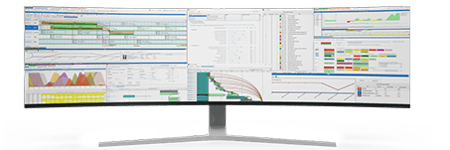Optimizing Cost Structures
Controlling costs while maintaining quality and efficiency is crucial for long-term success in chemical manufacturing. Purchasing managers play a pivotal role in this balance, influencing not only raw material procurement but also the overall financial health of the business. One of the key challenges in the industry today is optimizing cost structures in the face of fluctuating market demands, price volatility of raw materials, and evolving regulatory requirements. Leveraging modern manufacturing solutions like PlanetTogether, integrated with enterprise resource planning (ERP) systems such as SAP, Oracle, Microsoft, Kinaxis, or Aveva, can unlock new levels of cost efficiency and operational effectiveness.

The Importance of Optimizing Cost Structures
Cost structure optimization in chemical manufacturing involves reducing expenses without compromising quality, safety, or compliance. For purchasing managers, this optimization typically includes better sourcing strategies, reducing waste, and improving procurement timelines. Achieving these goals requires a strategic approach, informed by real-time data, accurate forecasting, and cross-departmental collaboration.
Chemical manufacturing is distinct from other industries due to the complexity of raw materials, the high cost of non-compliance with safety regulations, and the critical need for precise inventory management. Even small errors in procurement can result in significant financial losses, whether from overstocking expensive materials, failing to meet just-in-time production needs, or inefficient supplier contracts.
![]()

The Role of Integrated Planning in Cost Optimization
Integrating advanced planning and scheduling (APS) solutions like PlanetTogether with leading ERP systems allows chemical manufacturers to optimize procurement and production workflows holistically. This integration ensures that purchasing decisions are aligned with production plans, demand forecasts, and financial targets.
Key benefits of integrating PlanetTogether with SAP, Oracle, Microsoft, Kinaxis, or Aveva include
Enhanced Visibility Across the Supply Chain: PlanetTogether’s integration with these ERP systems enables real-time data sharing across departments, providing purchasing managers with visibility into production schedules, inventory levels, and supplier lead times. This holistic view helps ensure that purchasing decisions are made based on accurate, up-to-date information, reducing the risk of over-purchasing or stockouts.
Accurate Demand Forecasting: By leveraging the demand planning modules in SAP, Oracle, Microsoft, Kinaxis, or Aveva, along with PlanetTogether’s scheduling capabilities, purchasing managers can accurately forecast raw material needs. This minimizes excess inventory and avoids the costly inefficiencies of last-minute procurement or rushed shipments.
Supplier Relationship Management (SRM): Integration also streamlines supplier management by allowing purchasing teams to access performance metrics and historical data. By using this data, companies can negotiate better terms, secure volume discounts, and build stronger relationships with key suppliers. Tools within PlanetTogether and ERPs facilitate better supplier collaboration, ensuring that raw materials are available when needed, and at competitive prices.
Improved Risk Management: In chemical manufacturing, delays in receiving raw materials can lead to downtime, missed deadlines, and substantial financial losses. Integrated planning systems offer predictive insights, allowing purchasing managers to identify potential risks in the supply chain, such as supplier disruptions or price fluctuations. These insights enable proactive risk mitigation strategies, such as diversifying suppliers or hedging against price volatility.

Strategic Sourcing and Inventory Management
Strategic sourcing is a fundamental pillar of cost structure optimization in chemical manufacturing. As a purchasing manager, ensuring that the right materials are sourced at the right time, in the right quantity, and at the lowest possible cost requires advanced planning tools. Integration between PlanetTogether and ERP systems is a game-changer in this area.
Key Strategies for Optimizing Sourcing and Inventory Management
Dynamic Inventory Optimization: PlanetTogether, when integrated with an ERP system like SAP or Oracle, allows for dynamic inventory optimization. The software analyzes current and historical data, adjusting procurement plans in real time to account for fluctuating demand or changes in production schedules. This prevents overstocking and understocking, both of which can negatively impact profitability.
Supplier Lead Time Optimization: Many ERPs have built-in supplier management tools that can be enhanced by PlanetTogether’s scheduling capabilities. This integration ensures that procurement teams know precisely when materials are needed based on production timelines. By optimizing lead times and aligning them with production schedules, companies can reduce holding costs and improve cash flow management.
Minimizing Waste and Reducing Surplus Stock: Chemical manufacturing often involves dealing with perishable or hazardous materials, making waste reduction a top priority. Integrating PlanetTogether with SAP or Oracle allows purchasing managers to precisely forecast material needs, reducing excess stock that may spoil or become obsolete. Furthermore, reducing surplus stock directly impacts storage costs, helping the company remain leaner and more agile.
Supplier Collaboration and Cost Efficiency
Purchasing managers in chemical manufacturing must also focus on strengthening supplier relationships to optimize cost structures. An integrated PlanetTogether and ERP solution can foster improved communication and collaboration with suppliers, leading to cost-saving opportunities.
Vendor-Managed Inventory (VMI): Many ERP systems offer VMI solutions, where the supplier takes responsibility for managing inventory levels based on agreed-upon metrics. Integrating this capability with PlanetTogether’s scheduling system ensures that suppliers are provided with accurate production forecasts, allowing them to deliver materials just in time for production, minimizing holding costs and reducing the risk of stockouts.
Real-Time Supplier Performance Tracking: Integrated systems provide purchasing managers with real-time data on supplier performance, allowing them to assess the reliability, cost-effectiveness, and quality of materials provided. This data can be used to renegotiate contracts, switch suppliers, or pursue bulk purchase agreements to secure lower costs.
Supplier Risk Management: In chemical manufacturing, supplier disruptions can have a severe impact on production timelines and costs. PlanetTogether’s integration with ERP systems enables purchasing managers to monitor potential risks, such as delays or quality issues, in real-time. Proactive measures, such as identifying alternative suppliers or adjusting production schedules, can be implemented quickly to mitigate these risks.
Reducing Production Costs through Precise Scheduling
While purchasing managers focus on optimizing raw material procurement, production efficiency also plays a significant role in cost structure optimization. PlanetTogether’s advanced scheduling capabilities, when combined with the ERP’s production modules, can drive significant savings.
Minimizing Downtime: Effective production scheduling reduces downtime by ensuring that the right materials are available at the right time. By integrating PlanetTogether with SAP or Oracle, for example, companies can synchronize purchasing schedules with production needs, minimizing idle time and increasing overall efficiency.
Optimized Batch Processing: In chemical manufacturing, batch processing is common, and optimizing batch sizes is key to cost efficiency. Integrated systems can automatically calculate optimal batch sizes based on current inventory levels, demand forecasts, and production capacity, reducing waste and maximizing throughput.
Energy and Resource Efficiency: Scheduling systems like PlanetTogether can also help minimize energy and resource consumption by optimizing production schedules. For example, by aligning high-energy processes with lower-cost energy periods, or by ensuring that raw materials are utilized efficiently, companies can reduce operational costs.
Data-Driven Decision Making
One of the most transformative benefits of integrating PlanetTogether with ERP systems is the ability to make data-driven decisions. Real-time access to production, procurement, and inventory data allows purchasing managers to identify inefficiencies, optimize processes, and adjust strategies in real-time.
KPIs and Dashboards: Many ERP systems provide dashboards and key performance indicators (KPIs) that help purchasing managers track cost-saving initiatives, supplier performance, and procurement efficiency. PlanetTogether’s integration enhances this by adding real-time scheduling data, giving a comprehensive view of the entire supply chain and procurement process.
Continuous Improvement: The integration of PlanetTogether with ERP systems supports a culture of continuous improvement. By regularly analyzing performance data, purchasing managers can identify trends, inefficiencies, and new opportunities for cost savings, making incremental improvements to the procurement process over time.
Optimizing cost structures in chemical manufacturing requires a combination of strategic sourcing, precise scheduling, and supplier collaboration. Purchasing managers play a critical role in achieving these goals, and modern planning tools like PlanetTogether, integrated with ERP systems such as SAP, Oracle, Microsoft, Kinaxis, or Aveva, offer the capabilities needed to succeed.
By leveraging these integrated solutions, chemical manufacturers can streamline their procurement processes, improve inventory management, reduce waste, and enhance supplier relationships—ultimately driving cost efficiency and competitiveness in a challenging market.
Are you ready to take your manufacturing operations to the next level? Contact us today to learn more about how PlanetTogether can help you achieve your goals and drive success in your industry.
Topics: PlanetTogether Software, Accurate Demand Forecasting, Integrating PlanetTogether, Enhanced Visibility Across the Supply Chain, Chemical Manufacturing, Improved Risk Management, Supplier Relationship Management (SRM)




















LEAVE A COMMENT